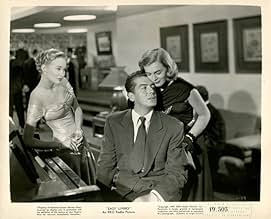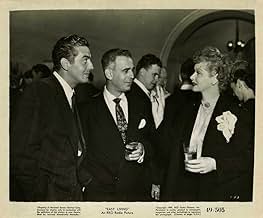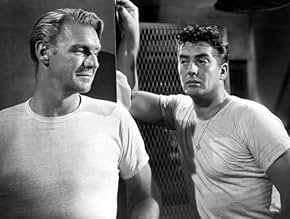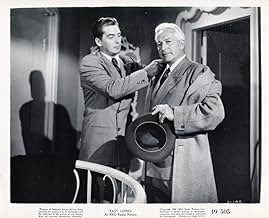Aggiungi una trama nella tua linguaPete Wilson is on top. He is the highest paid professional football player in the league. He has seen other players come and go, but he was MVP last year and the future looks rosy. His wife,... Leggi tuttoPete Wilson is on top. He is the highest paid professional football player in the league. He has seen other players come and go, but he was MVP last year and the future looks rosy. His wife, Liza, is there for the fame, the money, the good times and does not like those who are wa... Leggi tuttoPete Wilson is on top. He is the highest paid professional football player in the league. He has seen other players come and go, but he was MVP last year and the future looks rosy. His wife, Liza, is there for the fame, the money, the good times and does not like those who are washed up. His friend Tim, just retired and accepted a job as head coach at State. But Pete ... Leggi tutto
- Regia
- Sceneggiatura
- Star
- Buddy Morgan
- (as Dick Erdman)
- Dr. Franklin
- (as James Backus)
Recensioni in evidenza
Star quarterback Victor Mature is a regular guy, but is drawn into the fast lane by ambitious wife Liz Scott. She's all glamor and ego, eager to hang on to her headline husband. The scenes of urban highlife and sophistication are particularly well done-- the penthouses and sleekly groomed sharks swimming around eyeing new prey. Vic's uncomfortable and senses glamorous snares, but Liz sees only social climbing opportunity, while souless, silver fox Art Baker is only too happy to oblige. In a word she strays.
On the other hand, good guy Sonny Tufts (in a tailor made part) and salt-of-the-earth wife Jeff Donnell represent the other side of Mature-- his down-to-earth side. He's drawn in both directions, and it's this conflict that sets the dramatic stage. Will he hang on to Liz and the easy life or settle for a meagre coaching job with pal Tufts. He'll have to decide because the old ticker has become a problem. In short, he's facing a crisis of values.
One scene really worth noting. The team has cut journeyman lineman Gordon Jones. He's the kind of player who eats dirt every week so the quarterback can look good. Behind him are a thousand more grunts waiting to take his place. Now he wants a piece of a tavern and a place to hang his jersey and maybe a little dignity for all the pain. Watch his quick, knowing reactions to the snobbish Liz as she ignores this "loser". What a great line when he refuses the ride next to her, saying, "The subway's good enough for me". It's a whole little morality play summed up in a few seconds.
Unfortunately the film shows its period with an unsatisfactory Hollywood ending consistent with the conventions of the day, and enough to make modern-day feminists apoplectic. Then too, the Lucille Ball role seems overdrawn and unnecessary. Nonetheless, the supporting cast is outstanding, blending easily into a smoothly executed production that again demonstrates the industry's polished level of professionalism. Definitely deserves a second look.
The other story centers on the quarterback's troubled relationship with his ambitious, social-climbing wife who's not above using her seductive charm to make a success of her interior decorating business. Here again there are intriguing insights into the world of 1949, where "uppity" women had to be taken down a notch or two lest they forget their proper roles as wives and mothers.
These two stories don't merge particularly well, resulting in an awkward blend of "locker room" and "Park Avenue," and the ending seems forced and unconvincing. (This may have been due to the Production Code's dim view of divorce.) However, the cast still makes the movie worth a look, with solid work from Lucille Ball, Lloyd Nolan, Jim Backus, Art Baker, Jack Paar, etc. Lizabeth Scott -- she of the spectacular eyebrows -- seems a tad "overheated" as the self-centered wife but the script probably forced this kind of performance. Victor Mature has the better part and he acquits himself in adequate fashion. In his locker room scene he gets to strip off his shirt and thus reveal one of the great torsos in the movies. (And how gloriously it was soon to be whipped and otherwise tortured in such films as "Samson and Delilah," "The Robe," "Zarak," and "Timbuktu.") Too bad the movie as a whole isn't equal to its star's chest measurement.
These two are an odd pair. That's an aside, having little to do with whether or not the movie works -- and I do think it does.
Lloyd Nolan is excellent as the coach. Lucille Ball gives a subdued performance as his secretary.
Almost no one in this movie has what or who he or she wants. A gloom hangs over it.
Jacques Tourneur was an excellent director. This isn't his best. But I have a feeling it was a bit of a challenge for him -- a very all-American setting and plot. And he brings it off beautifully.
"Easy Living" is of course an ironic title. Wilson's life, as a quarterback and as a husband, is anything but easy. As the story evolves, he must come to terms with both the loss of his livelihood and the possible end of his marriage. Victor Mature, who played gladiators both ancient and modern, does his best but he isn't quite up to the emotional demands of the role. And Lizabeth Scott, ever the ice princess, never comes across as Wilson's wife. The supporting cast, featuring Lloyd Nolan as the head coach and Lucille Ball as his son's widow, is generally stronger. Jack Paar, in one of his rare film roles, pops up as the team's PR man.
The film's climax, in which Wilson slaps his wife in desperation, could never be made today but still was acceptable in 1949. Frankly though, you can't help share Wilson's frustration with this frivolous woman and you have to wonder what you would do in his place.
Highly recommended, both as a study of mid-century social attitudes and for an early Hollywood view of the NFL
Lo sapevi?
- QuizThe white football seen in the warm-ups for the night game at the end of the film was used in the NFL for such games from 1929 to 1955. It was considered to be more visible to the players and fans than the typical brown football. By 1956 better stadium lighting, especially needed for television, made the white football obsolete.
- BlooperThough the team's name is the Chiefs, their helmets have horns on them like the NFL's Los Angeles Rams.
- ConnessioniFeatured in Caccia alla volpe (1966)
I più visti
- How long is Easy Living?Powered by Alexa
Dettagli
- Tempo di esecuzione1 ora 17 minuti
- Colore
- Proporzioni
- 1.37 : 1
Contribuisci a questa pagina





































